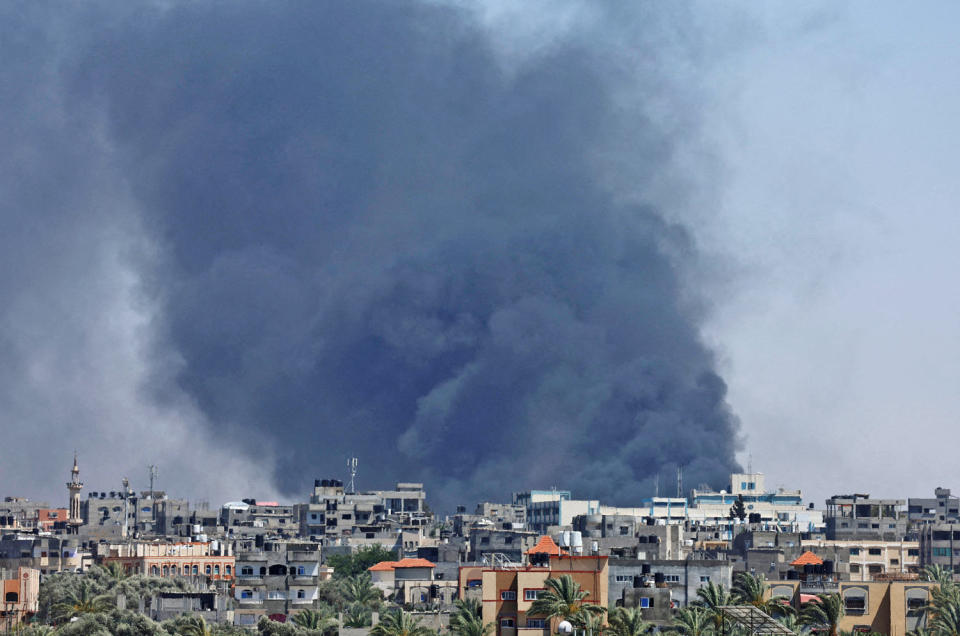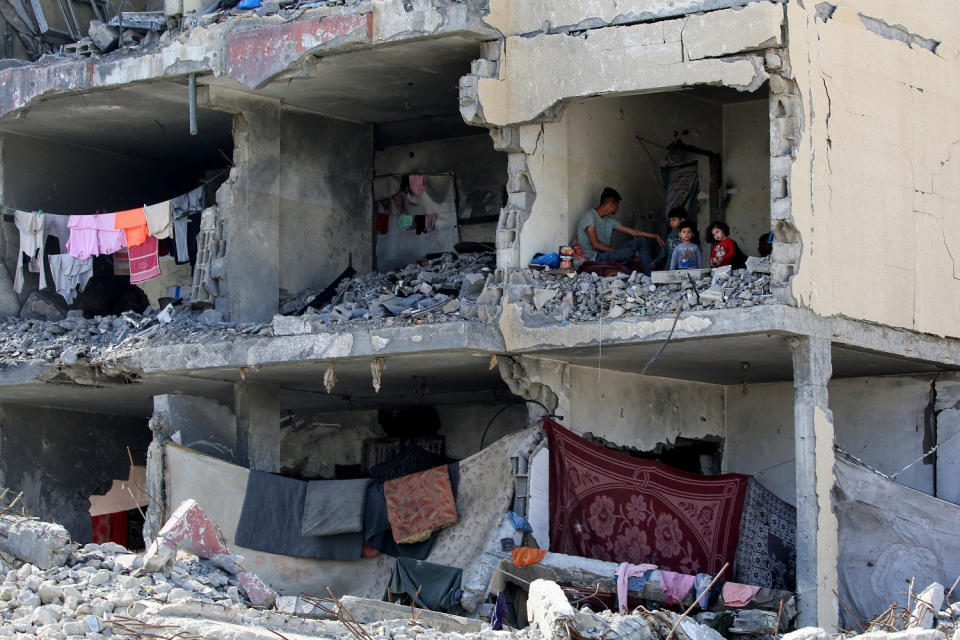Israel ordered to immediately halt Rafah offensive by top U.N. court
- Oops!Something went wrong.Please try again later.
The International Court of Justice on Friday ordered Israel to immediately halt its military assault on Rafah, the city in southern Gaza where more than 1 million people had sought refuge in dire conditions.
The top United Nations court cited an "immediate risk" to Palestinians, noting that more than 800,000 people had been forced to flee Rafah since Israeli forces began ground operations in an area that had once been declared a safe zone.
Judge Nawaf Salam, president of the ICJ, said Israel had failed to sufficiently address and dispel concerns raised by its offensive, all while the "catastrophic" living conditions of Palestinians in the strip had deteriorated further.
Israel is unlikely to comply with the order, which the ICJ has no power to enforce, but the landmark ruling will pile pressure on the increasingly isolated U.S. ally.
Israel has indicated it would not accept a court order to end the war against Hamas. Prime Minister Benjamin Netanyahu was meeting with legal advisors to review the ruling, an Israeli official told NBC News, shortly after it was issued.
Israeli Opposition leader Yair Lapid also criticized the ruling on X, saying the court had not made a connection between the fighting in Rafah and the return of Israeli hostages.
Hamas meanwhile, welcomed the decision, saying it expected the ICJ to issue a similar decision for the whole of the Gaza Strip and not just Rafah.

Defying mounting international outrage over the humanitarian crisis in the enclave, the Israeli military has pressed ahead with the deadly offensive it launched in the wake of Hamas' Oct. 7 attacks. Talks for a cease-fire have stalled, despite pressure at home for Netanyahu to secure the release of hostages still held in Gaza.
Judge Salam on Friday also reiterated the ICJ's concerns for the safety of hostages held in Gaza and called for their immediate and unconditional release.
The ICJ's order follows an urgent plea by South Africa as part of its ongoing case at the court, based in The Hague, Netherlands, accusing Israel of genocidal acts in its monthslong assault on Gaza, a charge both Israel and the United States have denied.
The case will likely take years to resolve, but South Africa sought interim orders to protect Palestinians.
Friday's ruling comes just days after the International Criminal Court’s chief prosecutor applied for arrest warrants for Netanyahu and Defense Minister Yoav Gallant, as well as Hamas leader Yahya Sinwar and others over alleged war crimes.
The ICC can charge people with war crimes and other related charges. It is separate from the ICJ, which considers cases between states and has no real power to enforce its rulings. Russia, for example, ignored an order in 2022 to halt its war in Ukraine.
The ICC announcement earned swift condemnation from Israel and from President Joe Biden, who said the “outrageous” move suggested a false “equivalence” between Israel and Hamas in a stance that put him at odds with several allies.
Days later Spain, Norway and Ireland announced that they would formally recognize a Palestinian state, sparking outrage in Israel.
Israel says its Rafah operation is necessary to defeat Hamas, despite public skepticism from Washington.
Fighting has also continued in northern and central Gaza, including in areas the IDF previously said it had cleared of Hamas’ presence. On Friday, the IDF announced it had retrieved the bodies of three hostages in the area of Jabalia camp in northern Gaza as part of those operations.
“We have a national and moral duty to do everything we can to return our abducted,” Netanyahu said.
More than 35,000 people have been killed in the enclave, according to local health authorities, since Israeli forces began their offensive following Hamas’ Oct. 7 attacks, in which some 1,200 people were killed and around 250 others taken hostage, according to Israeli officials, marking a major escalation in a decadeslong conflict.
Some 125 people are believed to remain held in Gaza, with around a quarter of them believed to be dead.

The Biden administration has repeatedly warned Israel against launching a full-scale invasion of Rafah, threatening to withhold certain arms shipments. Israel has appeared to expand its operations in Rafah incrementally, rather than launching what might be perceived as a full-scale attack.
Humanitarian groups have warned of a spiraling crisis not only in Rafah, but also in parts of Gaza where hundreds of thousands have fled. Many lack of adequate access to food, water and other necessities.
The U.S. has said that the flow of aid into Gaza has increased since it installed a temporary pier earlier this month amid concerns over closed crossings that are crucial for the flow of supplies into Gaza.
In a January ruling, the ICJ ordered Israel to do everything it can to prevent genocidal acts in Gaza, but stopped short of ordering the immediate cease-fire that Palestinians and humanitarian groups had hoped for.
The decision also fell short of Israel's own calls to see the case thrown out, however, and delivered a high-profile blow to its efforts to justify its deadly offensive in Gaza as necessary to defeat Hamas and within the bounds of international law.
This article was originally published on NBCNews.com

